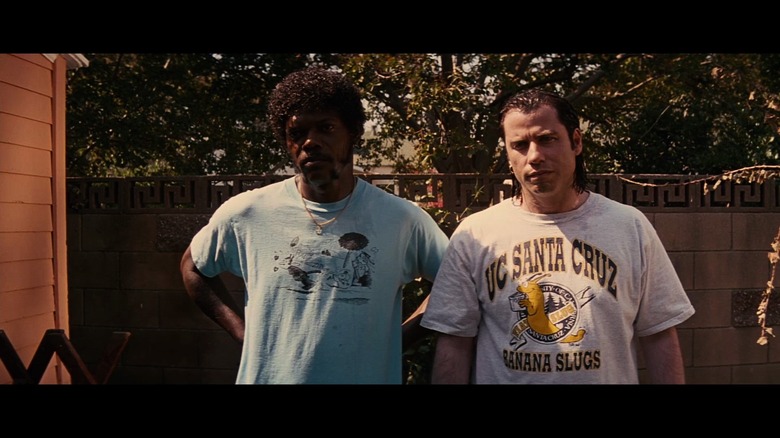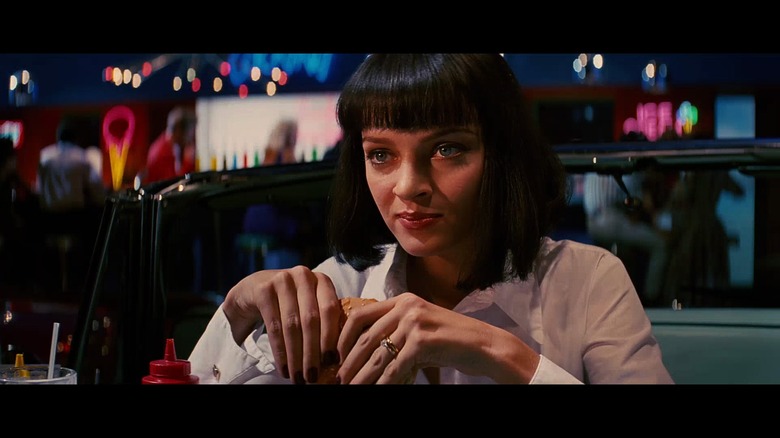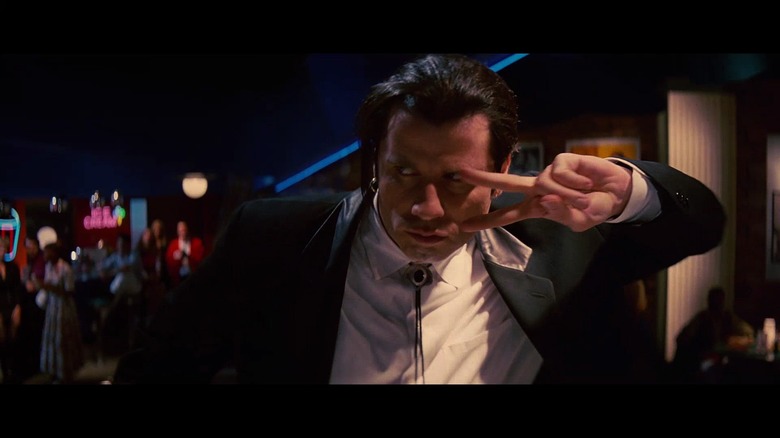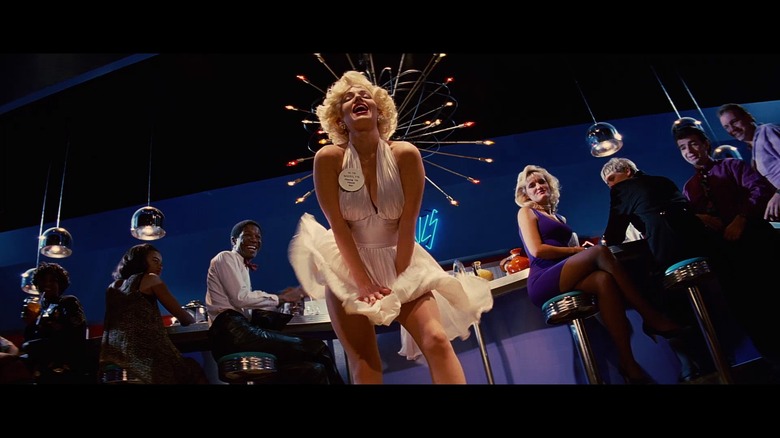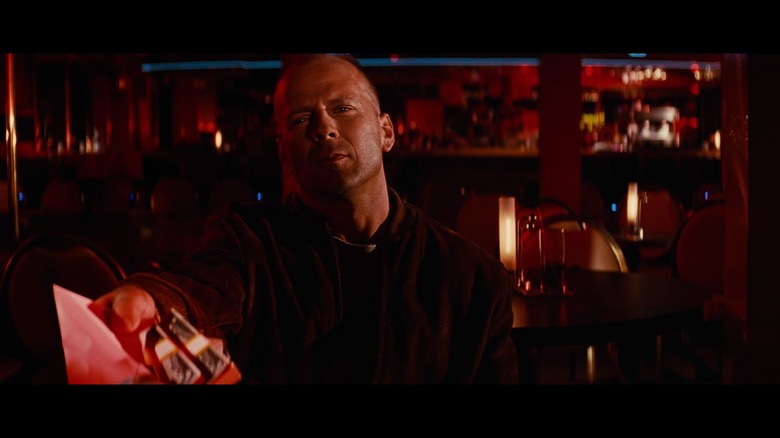'Pulp Fiction' At 25: The Path Of The Righteous Filmgoer Leads To Quentin Tarantino's 1994 Masterwork
Pulp Fiction is a profanity-laden crime drama with drugs, sodomy, and exploding brains, but when it hit theaters in mid-October 1994, it was technically a Disney movie. After Disney acquired the independent film studio Miramax in 1993, Pulp Fiction was the first project to receive a greenlight. The 2010s would commence with Disney shuttering Miramax, then selling it as it shifted focus to more lucrative in-house brands with theme park and merchandise potential, like Pixar and Marvel. Now, we're reaching the end of the decade and the end of a peak-geek year when, among other things, Disney has set a new studio box office record, with five of its tentpole features grossing over a billion dollars worldwide.
Meanwhile, at a '50s-themed restaurant in L.A. called Jack Rabbit Slim's, two people dominate the dance floor. It's a human moment, no special effects involved, just twisting legs, scissored fingers, and movie magic. When Vincent Vega and Mia Wallace (John Travolta and Uma Thurman) accept their dance trophy for the night, there's a part of them that might stand in for the whole '90s film scene, with its upswell of great indie dramas from new and exciting young filmmakers. Amid the current flood of remakes, reboots, sequels, and spin-offs, even the brain of an avowed comic book movie fan like yours truly might go hurtling back to the time when writer-director Quentin Tarantino and his contemporaries emerged on the scene in Hollywood. Back then, mid-budget dramas targeting adult theatergoers still seemed like the norm, as opposed to the exception.
Quotable dialogue and memorable characters come in all forms, including quippy, world-saving superheroes (which, again, I like more than Martin Scorsese); but with its down-to-earth lowlives and street-based plot turns, Pulp Fiction is a reminder of an all but bygone cinema era. Indelible music, cineliterate stylings, and a novelistic format help round out the perfection that is Tarantino's sophomore feature. A quarter-century ago, Pulp Fiction shook up what critic Gene Siskel called "the ossification of American movies." For its sheer innovation and cultural impact, this remains the most important American film of the last twenty-five years.
The Other Great Redemption Movie of 1994
Given its initial box office failure and slow build to popularity on TV and home media, not everyone will remember the first time they watched The Shawshank Redemption. But do you remember the first time you saw the other great redemption movie of 1994: Pulp Fiction?
The first time I caught a snippet of it was when a friend and I snuck into it after buying tickets to A Goofy Movie. We had no interest in watching a G-rated Disney animated feature that day but we were 13-year-old middle schoolers and it seemed like the best way to smuggle ourselves into a violent R-rated flick. I remember seeing the definition of the word "pulp" come up onscreen, followed by the opening shot of the two loquacious lovebirds, Pumpkin and Honey Bunny (Tim Roth and Amanda Plummer), as they chilled in the booth at the diner they were about to rob. Two ushers promptly caught us and kicked us out the back door of the theater.
The repeated mentions of Disney here go toward illustrating a larger point about Tarantino and his place in the grand scheme of American pop culture. In 1994, the highest-grossing film was the The Lion King. In 2019, the second highest-grossing film is ... The Lion King. Back in July of this year, Tarantino invoked Walt Disney's name in his latest feature, Once Upon a Time in Hollywood. In that movie, there is a scene where a precocious little girl, an actress, is reading a biography of Disney, talking about how he was a once-in-a-generation visionary. With its Leone-esque title, Once Upon a Time in Hollywood puts an improbable storybook spin on the Manson murders. It continues a wishful, history-correcting trend in Tarantino's work that began ten years ago in Inglourious Basterds. Over the last decade, his films have become progressively more fantasy-like in their endings, which has led to some talk of his unpredictability becoming predictable.
Whatever you think of Once Upon a Time in Hollywood (I've come to like it more as I've sat with it in my head since summer), it's clear that Tarantino is, on some level, grappling with his own cinematic legacy in 2019 via that film. In 1994, Pulp Fiction showed him to be a visionary, if not necessarily one on the same empire-building, once-in-a-generation level as Walt Disney. Tarantino's critics sometimes dismiss him as a mere pastiche artist who pilfers elements from other obscure movies, repackaging them as superficial homages in his own flashy flicks. By way of an example, in Pulp Fiction, the supposed Bible passage that Jules recites — Ezekiel 25:17 — is actually a longer speech that Tarantino lifted almost verbatim from the opening crawl of the '70s martial-arts film The Bodyguard, starring Sonny Chiba. Chiba would later go on to appear as the Man from Okinawa in Kill Bill, Vol. 1. You may know him as the sword-making sushi chef, Hattori Hanzo.
Much has been written about Pulp Fiction's discursive, nonlinear narrative, how its stories intersect and snake back around on each other. The film offers up a trilogy of tales — or ouroboros tails, if you will — where the theme of redemption plays out in various ways. Over the summer, Sergeant Subtext, soldier of movie themes (which is how I like to think of myself) went back and rewatched all of Tarantino's films in preparation for Once Upon a Time in Hollywood. I was particularly struck by how well Pulp Fiction held up in relation to his other films. When I felt like I finally, fully understood the movie these twenty-five years later, it caused me to reorder my Tarantino ranking (prior to this, my favorite '90s film of his had been Reservoir Dogs). Newsflash: Pulp Fiction is still an unqualified masterpiece.
This time around with Pulp Fiction, I found myself focusing on the redemption theme along with a specific aspect of the film's structure that had always struck me as somewhat random before. It has to do with the gheri-curled Jules — played by Tarantino regular Samuel L. Jackson — and his doughy partner, the aforementioned Vincent. Beyond the obvious answer that it sends them and us looping back into the movie, why does Pulp Fiction end the way it does, with Jules and Vincent walking out of the diner in clothes that make them look like "dorks?"
Jules sees divine intervention, "the touch of God," written in his fate. His reform comes about after he and Vincent miraculously survive gunshots at point-blank range in an apartment with a glowing 666 briefcase (which may or may not hold their boss's soul, if you believe that vintage movie MacGuffin theory). Ready to retire now, Jules confesses that he never gave much thought to his quasi-religious, Chiba-inspired speech, the one he's been saying for years as a warm-up for whacking his hitman targets. He tells Pumpkin, a.k.a. Ringo, "I just thought it was a cold-blooded thing to say to a motherf***er before I popped a cap in his ass. But I saw some shit this mornin' made me think twice."
Before his brush with death, Jules was a parrot of pop culture. He kept mindlessly repeating that Chiba-inspired speech, never knowing what it meant. His only reason for doing this was to entertain himself. Now, however, he's able to offer up three different interpretations of what the speech might mean in the context of the diner robbery. Tarantino once said, "Movies are my religion and God is my patron." Jules finds God and that entails walking away from the life of an unthinking peon in the pop culture farm.
New Adventures in Pop Culture Discernment
Non-fans of Tarantino might see Pulp Fiction as a film devoid of meaning, all style, no substance, with no deeper authorial intent beyond that of a riffing raconteur named Quentin. In this view, the film becomes the ultimate blank slate for cockamamie theorists and erudite pundits to project themselves onto—as the spirit of Tarantino, who's got the gift of gab, if nothing else, rouses their pseudo-intellectual selves from the stupor of passive entertainment. Yet if you look closer, as American Beauty once told us to, the redemption theme is there in Pulp Fiction and it's very much there by design. "It's explicit throughout the piece," Tarantino told Vanity Fair in a 2013 retrospective. As Jackson put it, "The people who are worth saving get saved."
Jules lives to walk the earth and get into adventures, while Vincent — the hitman and heroin junkie who refuses to recognize providence when it's staring him right in the face — dies coming out of the bathroom. There's a whole section on Wikipedia detailing how Vincent spends entirely too much time in the bathroom. He's in there on the toilet reading escapist spy novels and when he comes back out to the real world, something bad always happens. That's life.
Chronologically, the first of his return trips from the movie bathroom lands him in the middle of Pumpkin and Honey Bunny's diner robbery, where he joins them, gun drawn, to complete the obligatory Mexican standoff. The second lands him in the middle of Mia's drug overdose, after she's mistaken his heroin for cocaine and snorted it. The third results in his surprising death at the hands of the fugitive boxer, Butch Coolidge (Bruce Willis), who shoots him with his own casually abandoned MAC-10.
Vincent had three chances to change his ways. Three strikes, you're out. The moment that always stays with me is when one of his eyes sticks shut and he slurs his words in the restaurant booth after tasting Mia's five-dollar milkshake. They're parrying back and forth, having this mildly antagonistic conversation, and then we're reminded that he's on drugs. Both of them are lost souls, with Mia's glassy eyes barely containing her disappointment in life. She didn't make it as an actress and now her ennui only lifts when people deviate from the predictability of yakking about bullshit.
Unlike Vincent, the jerky, amoral Butch heeds the call to change. He drives off into the sunset on his Easy Rider motorcycle, having redeemed himself by going back to save his enemy from the Deliverance den where men are raped and gimps sleep in black bondage suits. The ball-gagged victim there is Marsellus Wallace (Ving Rhames), the boss Butch betrayed. Marsellus put down good money so that Butch would take a dive in his boxing match but then Butch took the money, bet more on himself, didn't take a dive, killed the other fighter, and ran. And didn't feel the least bit bad about it.
Butch, too, faces the choice of which kind of movie hero to be. He can be the bad guy and go about fighting the hillbilly pawnshop rapists with a chainsaw or baseball bat, like Leatherface or Al Capone. Or he can choose a more honorable weapon: the samurai sword. Who knows, the one in the pawn shop might even be a Hattori Hanzo sword.
For Quentin Tarantino, redemption comes through discernment of pop culture. I imagine that's why we're all here, on sites like /Film: because we like pop culture and because our most meaningful experiences with it do enrich our lives, redeeming them, first, from boredom, and later, maybe (if we have the eyes to see it, like Jules) from the worthlessness of unexamined lives.
Jules awakens to the unreality of postmodernity. He escapes the trap of hollow consumption. He's already undergone a baptism of sorts in the backyard of his friend, Jimmy, played by Tarantino himself. Jimmy and the Wolf, played by Harvey Keitel (Tarantino's first movie-god patron on Reservoir Dogs), stand by as Jules and Vincent strip off their bloody hitmen clothes in the backyard. The Wolf then sprays them off with a garden hose. It's a subtler invocation of baptism than Shawshank's outstretched prison-escapee arms in the rain, but it gets the job done.
Jules leaves the diner a newly enlightened person who can go out into the world in his dorky casual clothes and get into new adventures in pop culture discernment. He now walks the true path of the righteous man. Tarantino's torch-bearing '90s opus lights his way through the Zeroville door, back into this movie and others.
Once Upon a Time in Zeroville
Now what, you may be asking yourself, is the Zeroville door? Well, apart from its tenuous connection to a James Franco movie that bombed last month, the Zeroville door is my pet phrase for the brilliant high concept from a short story by Steve Erickson. The story, appropriately entitled, "Zeroville," (Erickson later re-developed it into an acclaimed novel, the basis for Franco's adaptation) takes the reader into the mind of a film editor named Monk, whose house is lined with "the enlarged celluloid images of a thousand doors, although really they're all the same door, moving from one location to another."
Monk has discovered these images spliced, one by one, into a thousand different movies. The implications of this are staggering. Different movies made by different people in different geographical locations at different times in history are all linked by the same mysterious door. What that door represents is "the Movie of the Future, hidden one frame at a time in every movie ever made." Who put that door there? Is there a divine thumbprint on those clandestine film frames? No one knows, but this, my friends, is the Zeroville door.
When Jules walks out of that diner in Pulp Fiction, he hits the Zeroville door. On the other side of that door, the secrets of the universe await him. With Pulp Fiction, Tarantino, the avid pop culture consumer, became like Jules: he became the enlightened artist who could not only talk the talk, but walk the walk ... and see the door. Can you see the door?
The Zeroville door opens to Le Gamaar, the Paris venue where two Jewish soldiers raid the opera box of Adolf Hitler and a woman's projected face laughs large from beyond the grave as Nazis burn to death in a cinema inferno.
The Zeroville door opens to the porch of a bar in rainy Austin, where a wolfish stuntman tries to secure a lap-dance by reciting, "The woods are lovely, dark and deep, but I have promises to keep, and miles to go before I sleep."
The Zeroville door opens to the House of Blue Leaves, where the sword-wielding Bride uses her survival energy to fend off eighty-eight crazy assassins (give or take one fierce Japanese schoolgirl with a Meteor hammer).
The Zeroville door opens to the office of an aging bail bondsman (played by an actor who just passed away last Friday), where he shares a kiss with a flight attendant and watches his last chance at love walk out of his life.
And so on and so forth, ad infinitum, not only through Tarantino's filmography, but through the informal multiverse of every movie ever made. The shamanic genius of Pulp Fiction — the closest Tarantino's ever come to Walt Disney's level of cultural significance — is such that its every onscreen reference opens a door into cinema's supercharged past. Christopher Walken monologuing about a POW camp in Vietnam takes us straight into The Deer Hunter. Travolta dancing takes us into Grease and Saturday Night Fever (and Batman: The Movie, with its Batusi dance moves, the V-sign fingers drawing across the eyes). The sight of bossman through the windshield (Marsellus) and the surprise of the driver and double-crosser caught at the crosswalk (Butch) takes us into a similarly framed moment with Marion Crane in Psycho.
Every one of those movies then links to another movie. It's Six Degrees of Kevin Bacon, writ holy. Tarantino mind-mapped the twentieth century on film. Marilyn Monroe's white dress blows up in Jack Rabbit Slim's ... and we remember that iconic movie moment, which has seeped into most people's brains even if they've never actually seen or heard of The Seven Year Itch, the film where it originated.
With his encyclopedic knowledge of cinema, Tarantino hacked its symbology and corralled it into a towering totem pole at the tail end of the millennium, where the sum total of a great many movies could be seen and felt. Think of him as the young Butch, that kid who was sitting in front of the television, when suddenly, Walken, a living legend, came walking in the room and squatted down next to him to tell him about the gold hidden in his shit. Butch went back to retrieve the gold watch in his apartment because it contained a piece of his soul. Tarantino inherited the gold and with Pulp Fiction and its gold motif, he passed it onto the audience, where it will live in posterity.
The Great Movie Ride … Narrated by Quentin Tarantino
"A wax museum with a pulse." That's how Vincent Vega describes Jack Rabbit Slim's and that's how some viewers, movie-hopping through the Zeroville door, might feel when they land back in Pulp Fiction. The film sees Tarantino working in-genre with crime movie conventions, but subverting them and incorporating the rhythms of everyday life, with all its twisting tangents and conversational inanities.
This is what situates Pulp Fiction in the subgenre of crime dramas. Its crackerjack dialogue cycles through such mundane topics as cheeseburgers in France, mayonnaise on French fries, the nature of TV pilots, foot massages and the ballparks of intimacy they inhabit ... and that's just one pre-chapter of the film, with Jules and Vincent talking on their way to kill some guys. The film starts to drag a bit during its motel meanderings with Butch and Fabienne (Marie de Medeiros), but moments of downtime like that give the sudden action beats the flavor of unexpected real-world happenings, instead of just Hollywood plot contrivances.
Opinions on Tarantino were mixed even before the fall of Harvey Weinstein (another one of Tarantino's patrons, this one decidedly less godlike and more satanic, if anything). Last year's New York Times revelations cast Tarantino and his slasher muscle car flick, Death Proof, in a new and unflattering light. Pulp Fiction and his other films are problematic in some respects, too.
To Tarantino's staunchest defenders, this might sound like recycled woke garbage, just another squawking line from that Chiba-inspired speech; but with Butch Coolidge in Pulp Fiction, Dr. King Schultz in Django Unchained, Chris Mannix in The Hateful Eight, and Rick Dalton and Cliff Booth in Once Upon a Time in Hollywood, there's a definite white-savior pattern running through Tarantino's film narratives. Intertextually, it feels like we can't simply chalk it up to Tarantino being a white rapper, the Eminem of the motion picture medium.
Tarantino once labeled the latter-day films of Martin Scorsese as "kind of geriatric." Yet in the 2010s, with longtime editor Sally Menke gone from his side, Tarantino's own films have become flabbier and more self-indulgent than they ever were. (I say this as someone who still thinks he's never made a bad film.) Tarantino's insertion of himself into his own movies is something that never used to bother me back in the '90s. I don't mind his appearances in Reservoir Dogs, Pulp Fiction, or even Robert Rodriguez's From Dusk Till Dawn. In the 2010s, however, it's gotten to be quite cringy: it's as if he can't help but take you out of his own movies sometimes and remind you that he, the onetime video store clerk turned almighty auteur, is still there.
On the one hand, seeing him pop into Django Unchained with an Australian accent, only to get blown up by dynamite, is rather humorous. On the other hand, there comes a point when the voiceovers of films like The Hateful Eight violate the traditional "Show, don't tell" standard of cinema in a needless way.
Despite all this, I've found, personally, that the trick to enjoying Tarantino's work, even in the sensitive landscape of 2019, is to surrender yourself over to it as the deeply personal extension of a flawed individual. When you're in the Tarantino-verse, you're in a Disneyland, or Banksy-like Dismaland, for adults. This realm is populated by all sorts of colorful characters, any one of whom could almost carry their own movie chapter, like Vincent, Butch, and Jules do. When the Wolf and Raquel (Julie Sweeney) exit the picture in Pulp Fiction, you wonder where those two goofs are going and what they'll talk about in the car. But they're not really the ones behind the wheel; Tarantino is. He's your irrepressible cinematic tour guide, similar to the ones who used to provide narration on The Great Movie Ride at Disney's Hollywood Studios.
On the Great Movie Ride, there would always come a point where a cowboy or gangster chased the tour guide off and hijacked your ride vehicle, before taking you into a scene from the movie Alien. Your ride in the Tarantino-verse may experience hiccups. It won't always run smoothly, but when you watch Pulp Fiction and the rest of his filmography, just imagine that it's Tarantino dressed up like a cowboy or gangster, giving you a ride through his favorite movies. Sure enough, in Django Unchained and Reservoir Dogs, respectively, Tarantino actually shows up onscreen dressed as a cowboy and gangster.
It's the Great Movie Ride ... narrated by Quentin Tarantino. If it were J.J. Abrams narrating this ride, you know exactly where he'd take you. He'd take you back through the scenes of all those classic Steven Spielberg and George Lucas films from the '70s and '80s. "Mere blockbusterism," as Erickson would say. Tarantino's tastes run more eclectic. He's got foreign films and exploitation movies he wants to show you.
The Next Pulp Fiction
Tarantino wasn't alone in conceiving the story for Pulp Fiction, of course. As The Independent noted in 2003, "[Roger] Avary had a hand in every Tarantino screenplay until Jackie Brown." This is part of the reason why I think Tarantino hit his stride more — and arguably peaked — in the 2000s, when he graduated from Avary and Elmore Leonard and assumed full authorship of the screenplays he would direct. Inglourious Basterds and Kill Bill (both volumes counted together) are monoliths of unadulterated Tarantino energy, and Death Proof is also more substantial when you view it as one half of the scratchy double feature Grindhouse (the way it was originally released).
Through the '90s, Avary was the silent partner who helped furnish the wunderkind with ideas for scenes like the one in Pulp Fiction where Vincent accidentally shoots Marvin in the car's backseat. Most notably, Tarantino adapted a portion of Avary's script, "Pandemonium Reigns," into Pulp Fiction's middle section, "The Gold Watch." This landed Avary a story credit, while the screenplay credit went to Tarantino and the Academy Award for Best Original Screenplay went to both of them.
Post-Pulp Fiction, Avary worked as a script doctor in Hollywood and he would later direct The Rules of Attraction and co-write the screenplay for Beowulf with Neil Gaiman. His latest directorial effort, Lucky Day, went into release just last Friday. The reviews have not been kind, with the Los Angeles Times slating it as "regurgitated Pulp Fiction."
Speaking of which, Tarantino spawned a lot of throwaway imitators in the '90s, but the more lasting contribution of Pulp Fiction has been its influence on other filmmakers who managed to synthesize the film's lessons about storytelling without outright copycatting it. In an interview with the Director's Guild of America, Christopher Nolan related how he "got hold of a script to Pulp Fiction before the film came out and was fascinated with what Tarantino had done." In 2000, Nolan went on to employ his own groundbreaking nonlinear narrative in Memento, and the rest is history.
You can also trace a line from Pulp Fiction to the show Breaking Bad, which subtly incorporated numerous visual echoes of the film throughout its 5.5 seasons on television. These are just two examples of pop culture giants that owe a debt to Tarantino's masterwork. Pulp Fiction and Reservoir Dogs built on the commercial success of Steven Soderbergh's Sex, Lies, and Videotape in 1989. In doing so, they helped pave the way for other indie filmmakers in the 1990s. A whole host of enthralling dramas danced larger-than-life in the aftermath of Pulp Fiction.
Many of the filmmakers behind those dramas — like Paul Thomas Anderson, who lists Pulp Fiction as one of his favorite movies — would cross over into the Hollywood mainstream, like Tarantino did. However, instead of being immediately drafted for superhero films or other studio tentpoles like they would nowadays, they were able to secure funding for more personal projects. In 1996, Anderson's Hard Eight, made on a $3 million dollar budget, opened at the Sundance Film Festival. Three years later, he would be handed his highest budget to date — $37 million — and granted final cut on a 3-hour drama with an ensemble cast led by Tom Cruise.
That would be unheard of in today's industry ... as would the prospect of a white filmmaker inserting himself into his own Best Picture nominee so he could spout racial epithets while sipping gourmet coffee. (Then again, there's Green Book.)
When he came along in the 1990s, Tarantino was part of the new guard. Now, he's part of the old guard: a generation of uber-talented but also maybe overprivileged filmmakers who once held the keys to the kingdom, much like the self-entitled "movie brats" of the New Hollywood era from 1967 to 1982.
These days, there are arguably more restrictions in place that make it harder for up-and-coming young filmmakers to navigate the studio system. At the same time, all things are cyclical, and the emergence, in recent years, of writer-directors like Jordan Peele shows that it's still possible for new breakout talents to seize mainstream attention with non-franchise films. Rigging the system toward blockbusters just puts the onus on non-franchise filmmakers to come up with better stories that can be told on a human scale. Too often, dramas become stodgy and plotless and sacrifice their hold on the audience's interest. At his best, that's something Tarantino was able to avoid.
I've written a fair number of movie anniversary articles like this for /Film and I realize it's very easy to fall into a nostalgia pit and start reminiscing about the movies of your youth with an attitude of, "They don't make 'em like they used to." But where's the next Pulp Fiction? Have we seen it already or is it still to come or is that moment in the culture already gone?
I like the Mouse House as much as the next Florida native, but as Hollywood continues to be swallowed up by the Disney hegemony this year, it feels like we've lost some vital part of the communal experience that once was, and still is, the movies. The decline of the drama in cinemas, it should be said, does not mean that it's dead. It just means that you have to look harder for it, cutting through the noise of all the other myriad distractions out there.
Tarantino vivified the art form with his crime dramas, but he may well retire soon, so in his potential absence, we can only look to the next generation of filmmakers—and showrunners. With more and more directors crossing over onto streaming platforms, some of the best dramatic work is being done on television now. It's been five years since David Fincher's last theatrical release, but you can turn on Netflix right now and watch Mindhunter. Or you can always go back and watch Pulp Fiction on your iPad. Zeroville door, open ye now.

